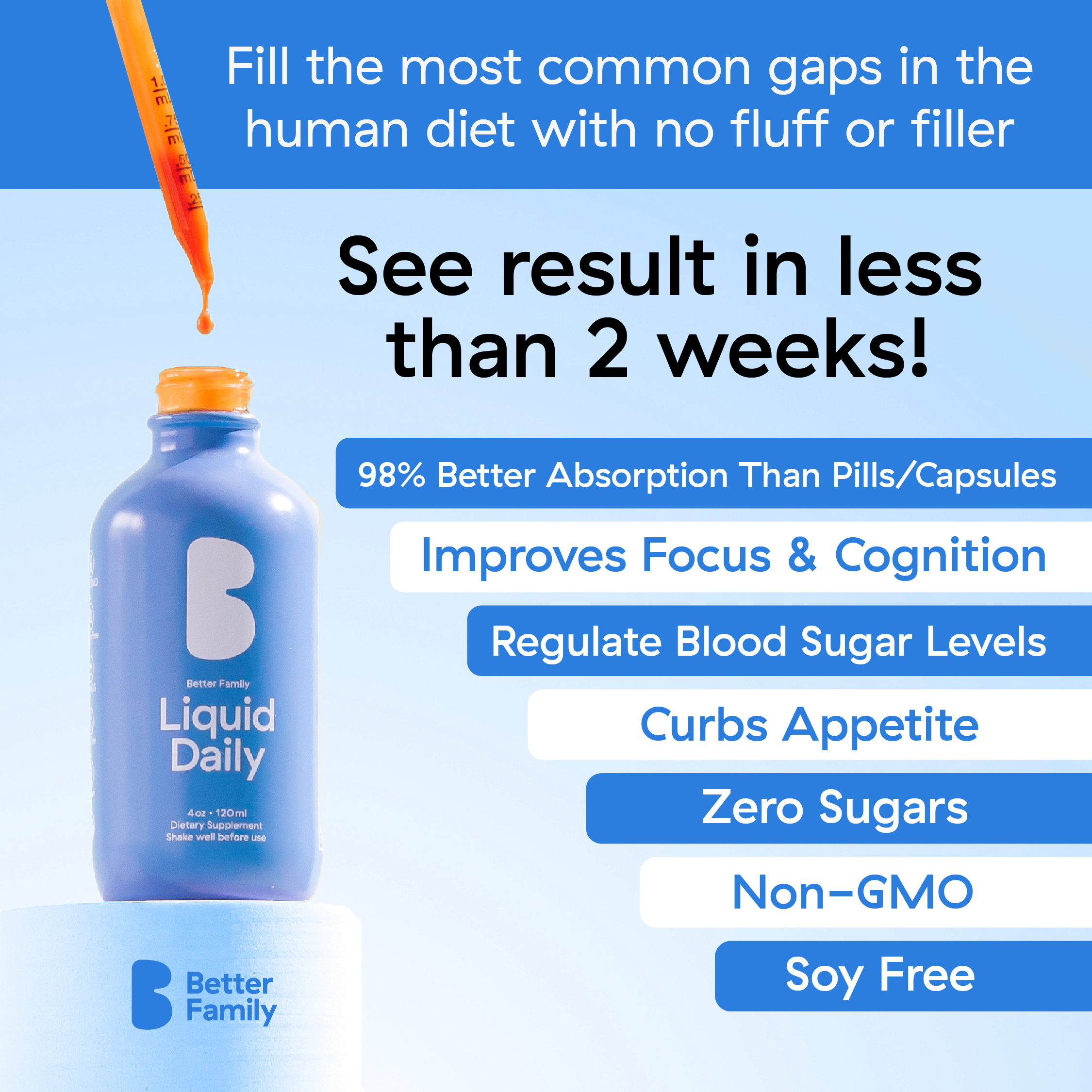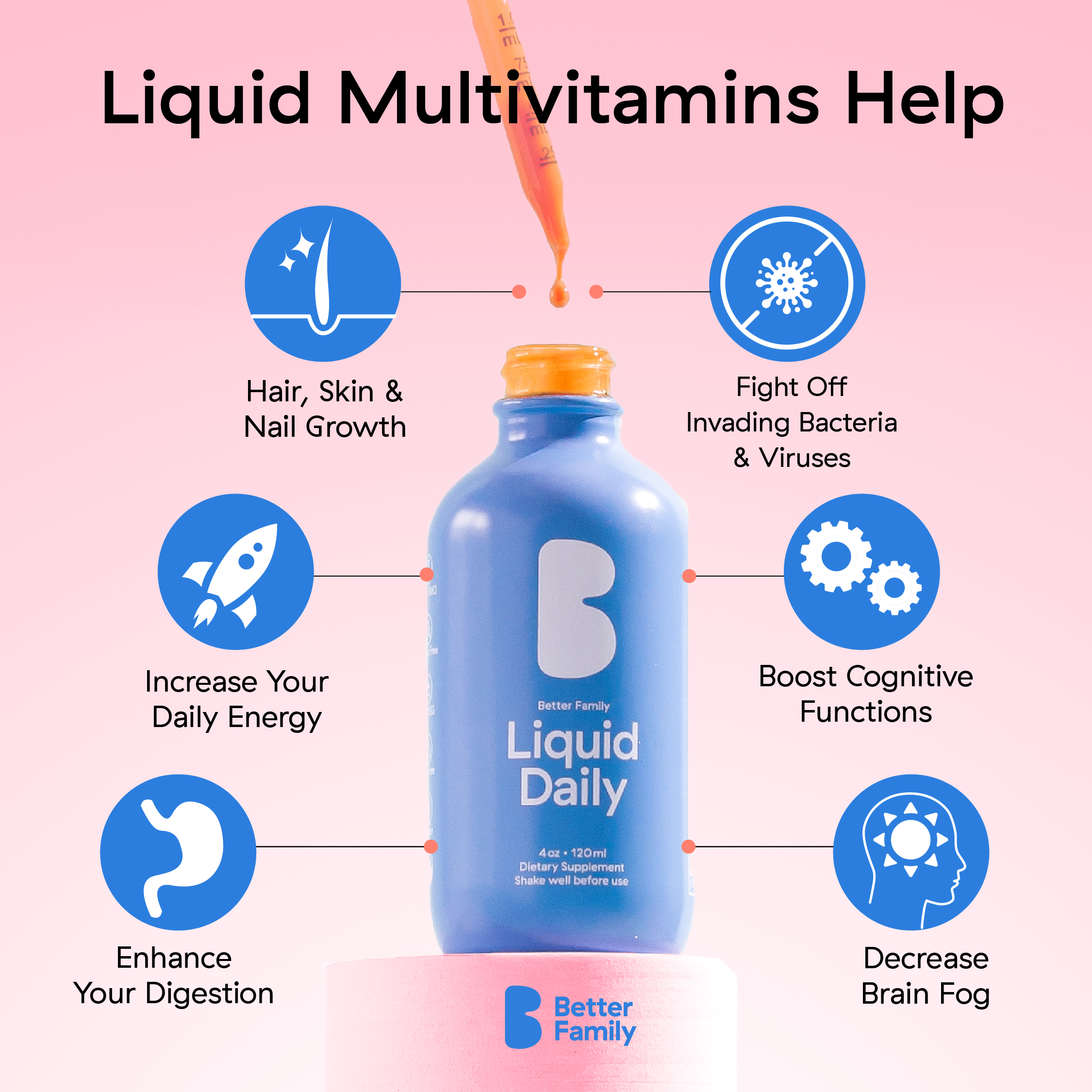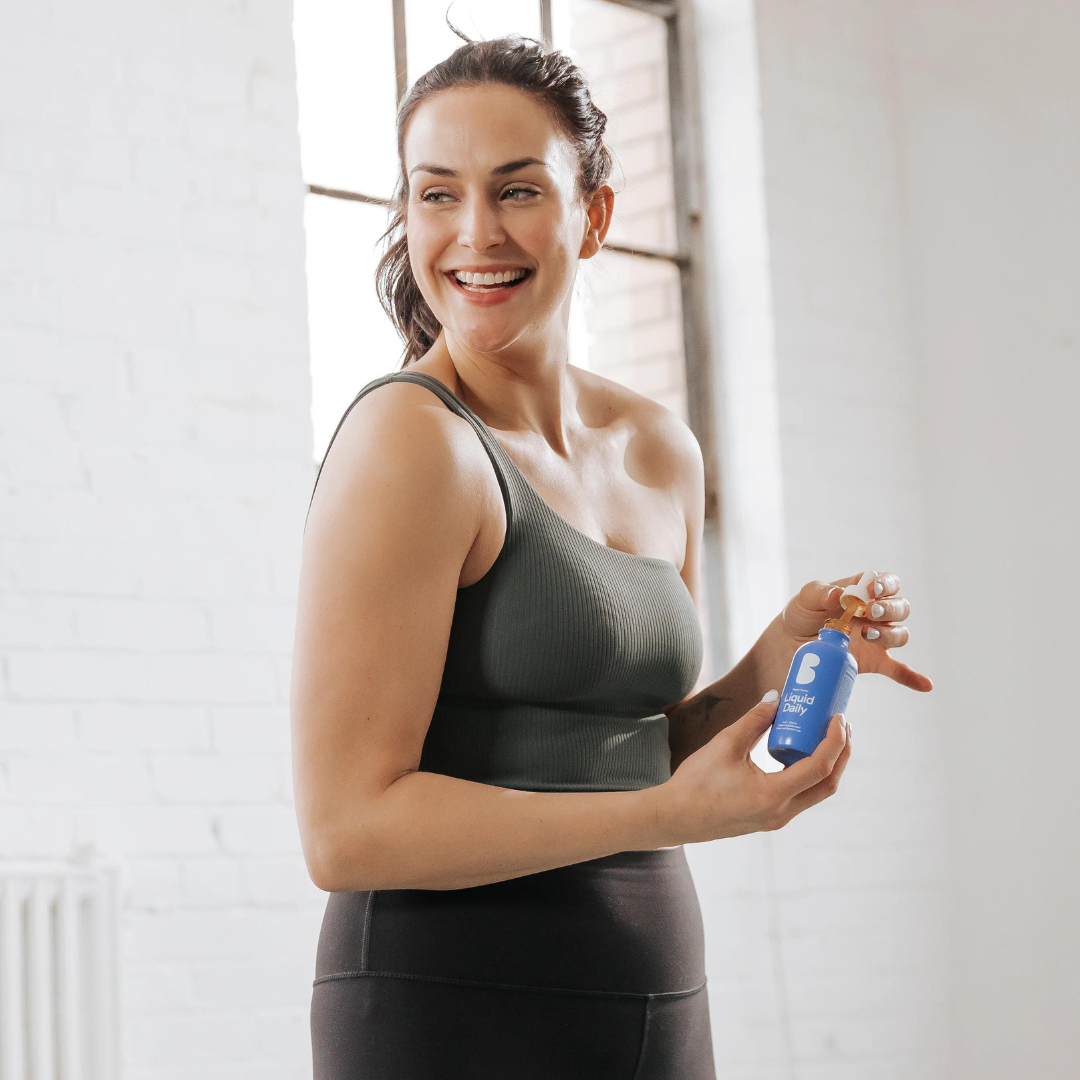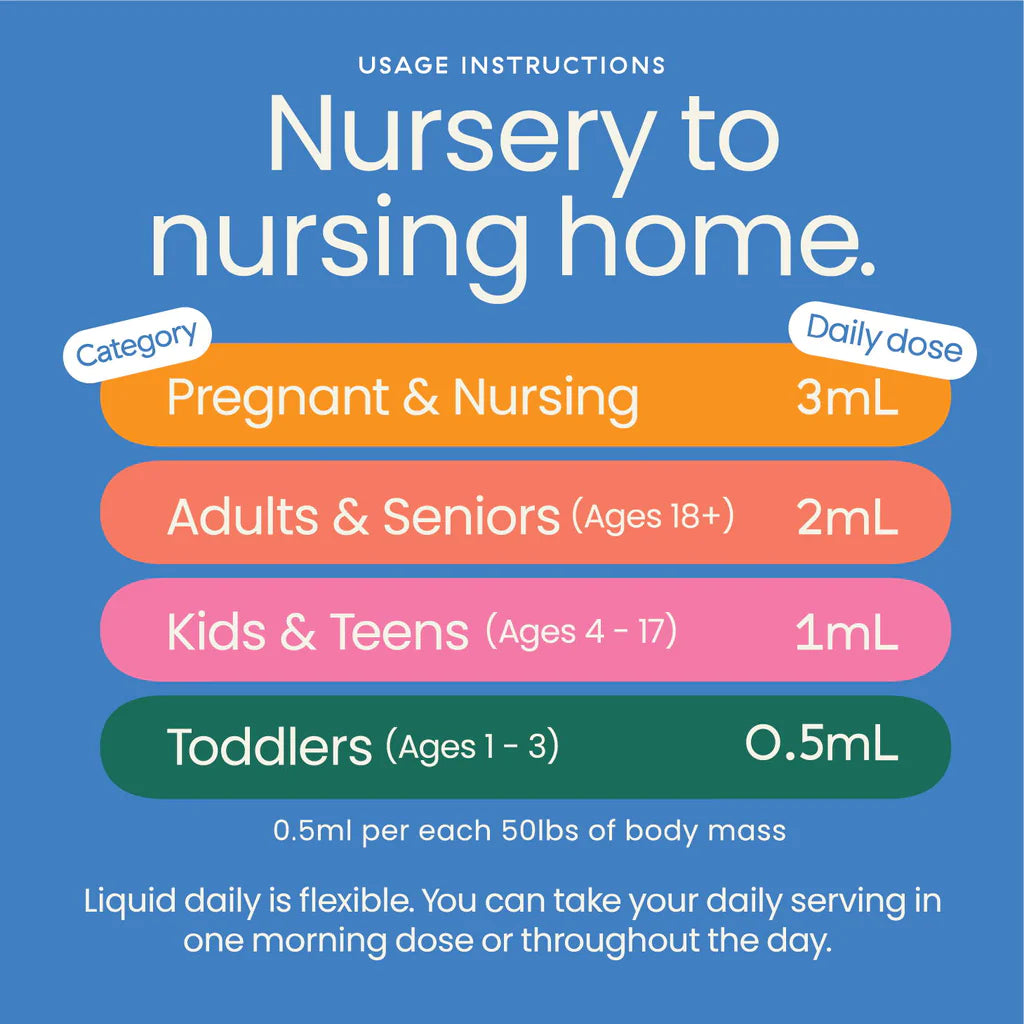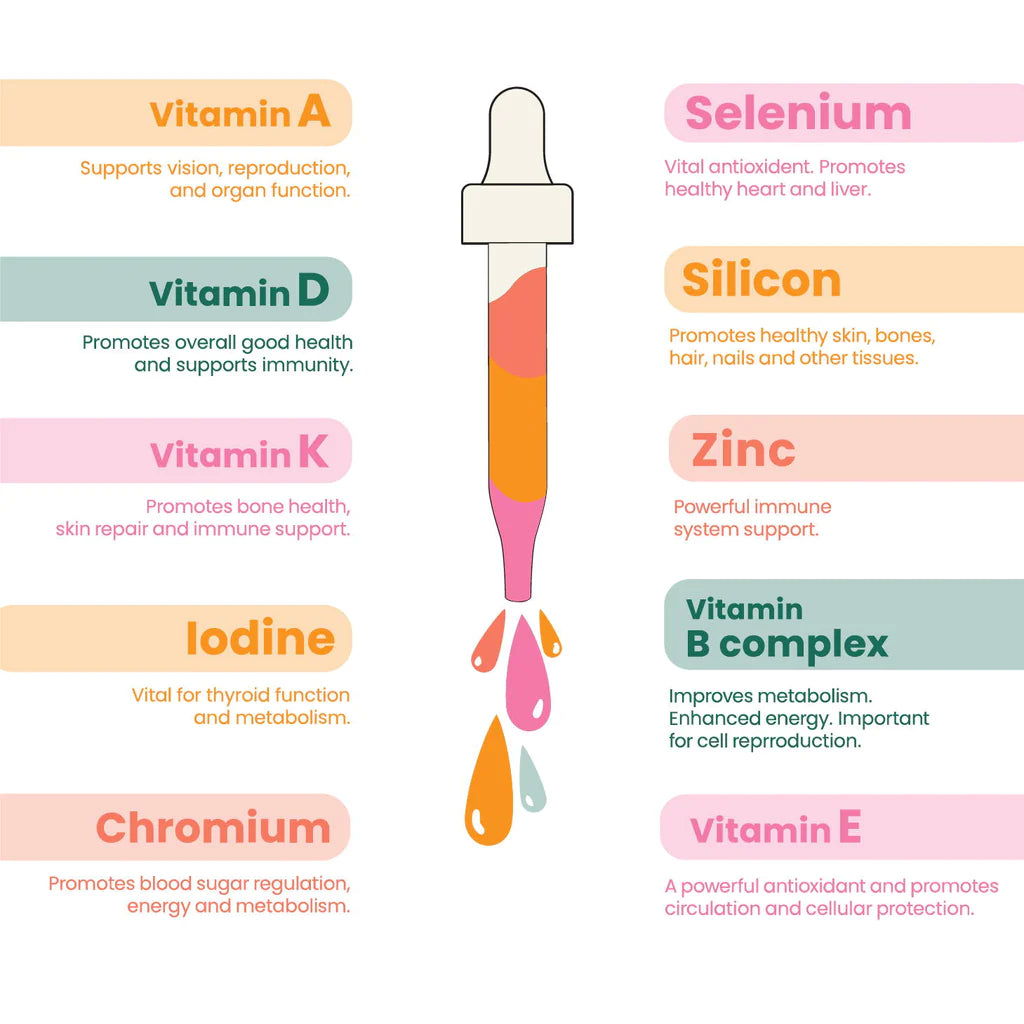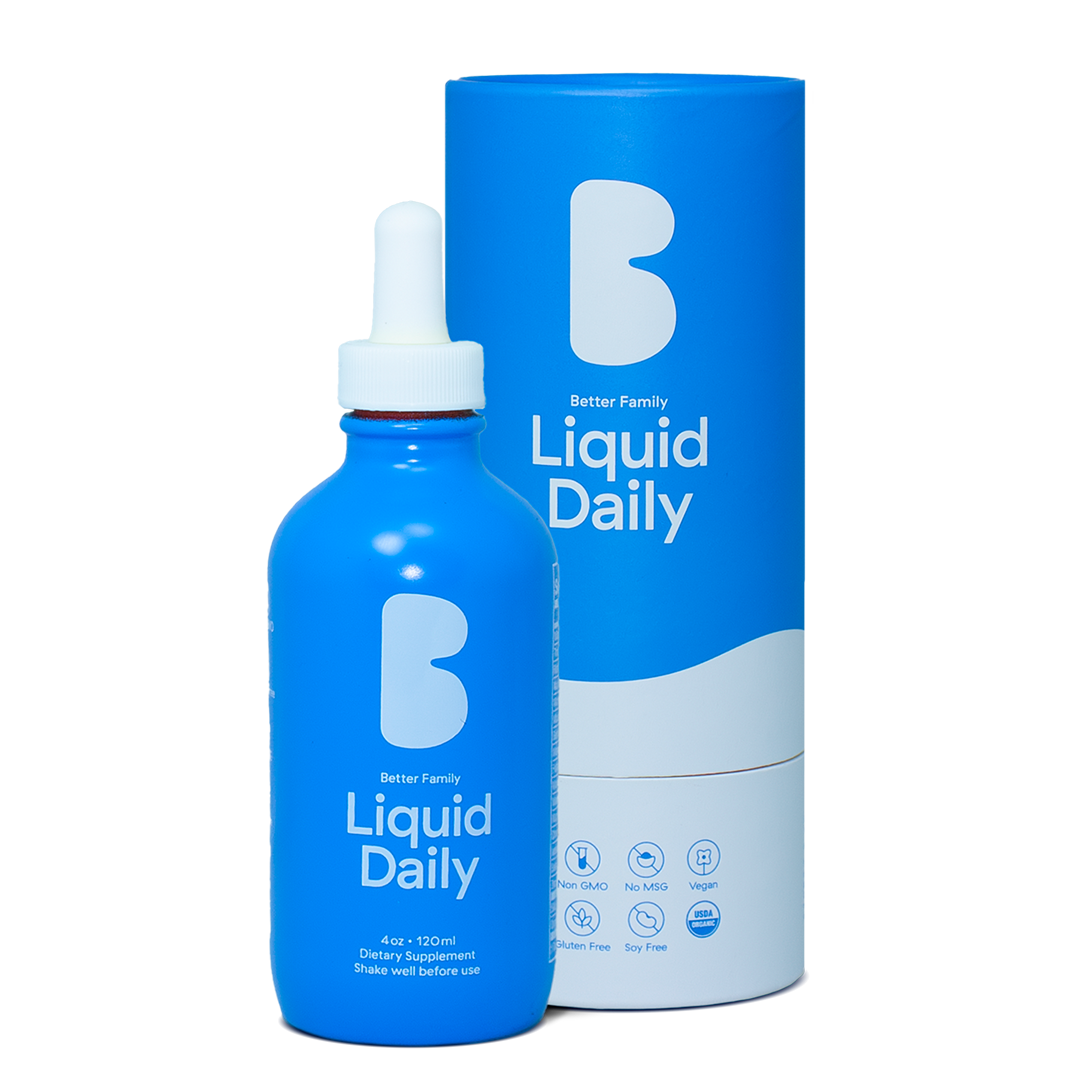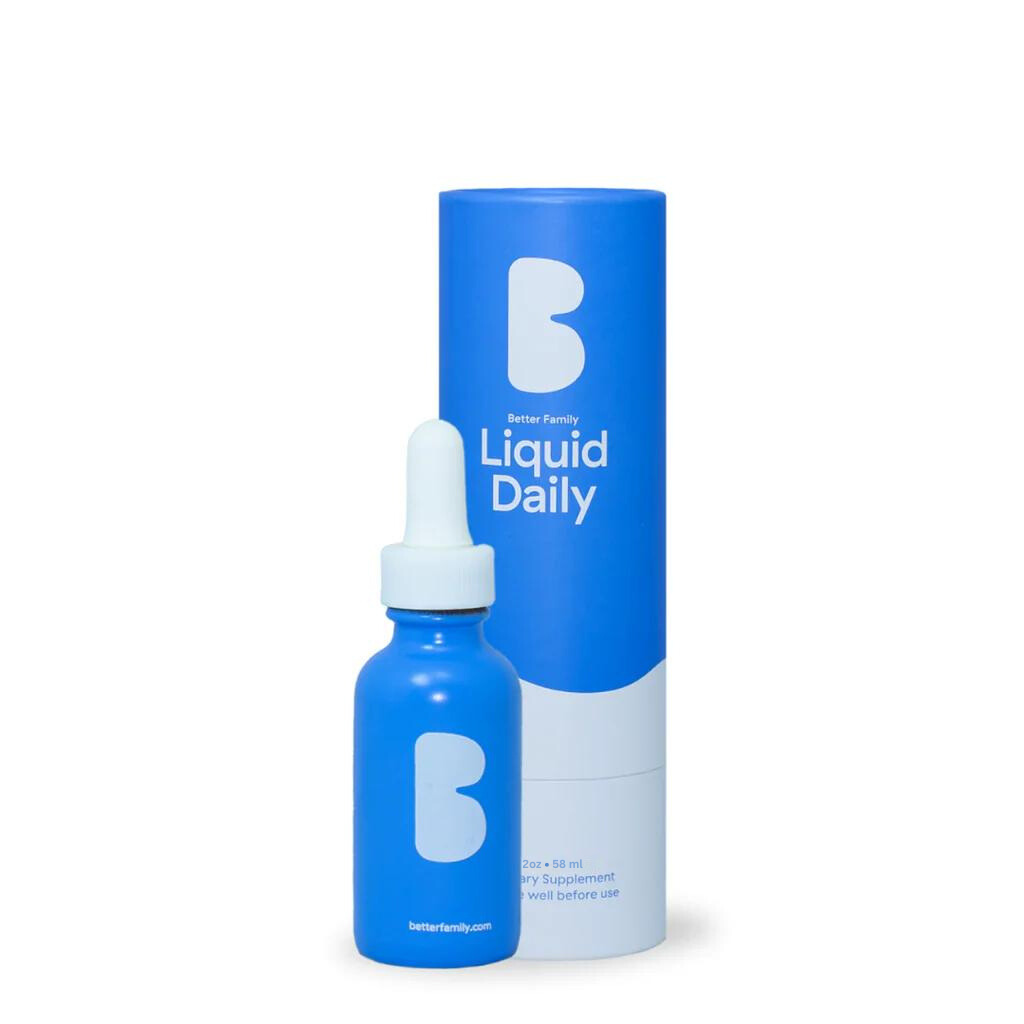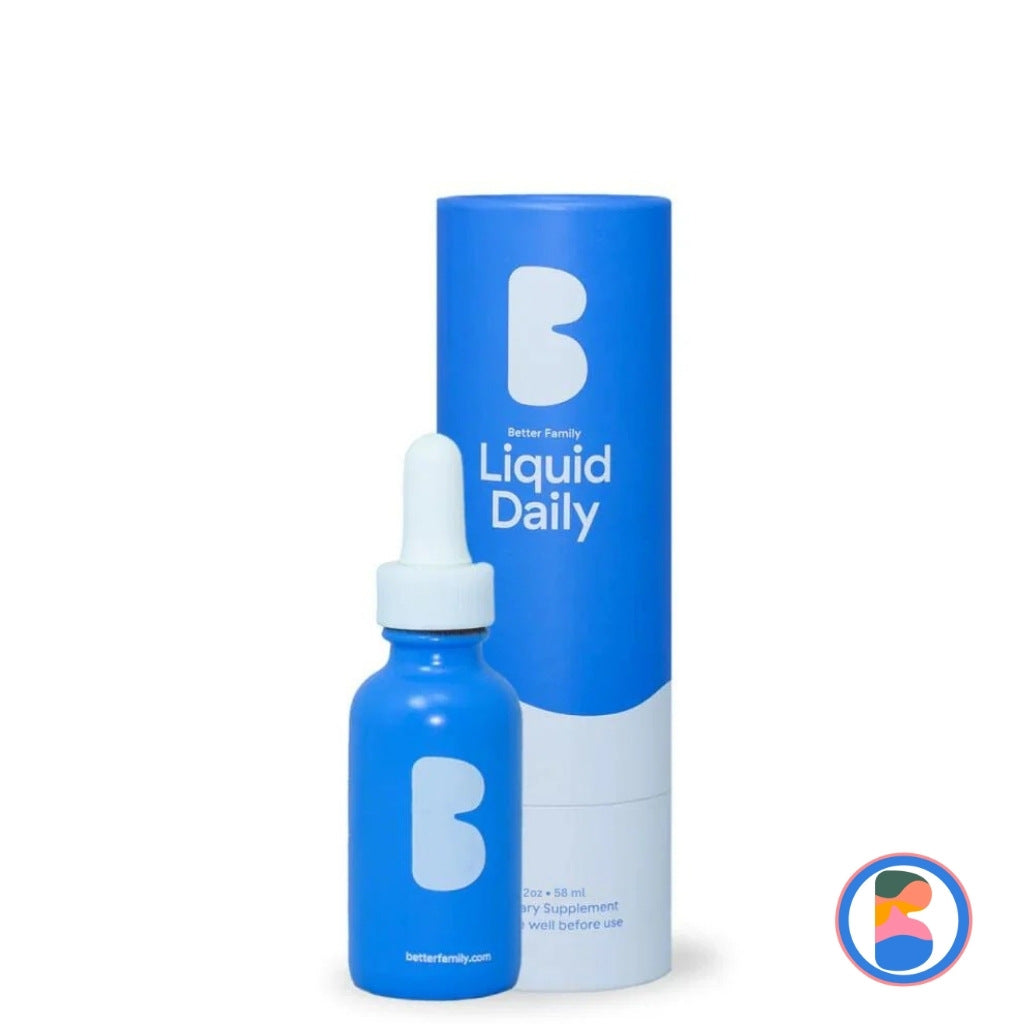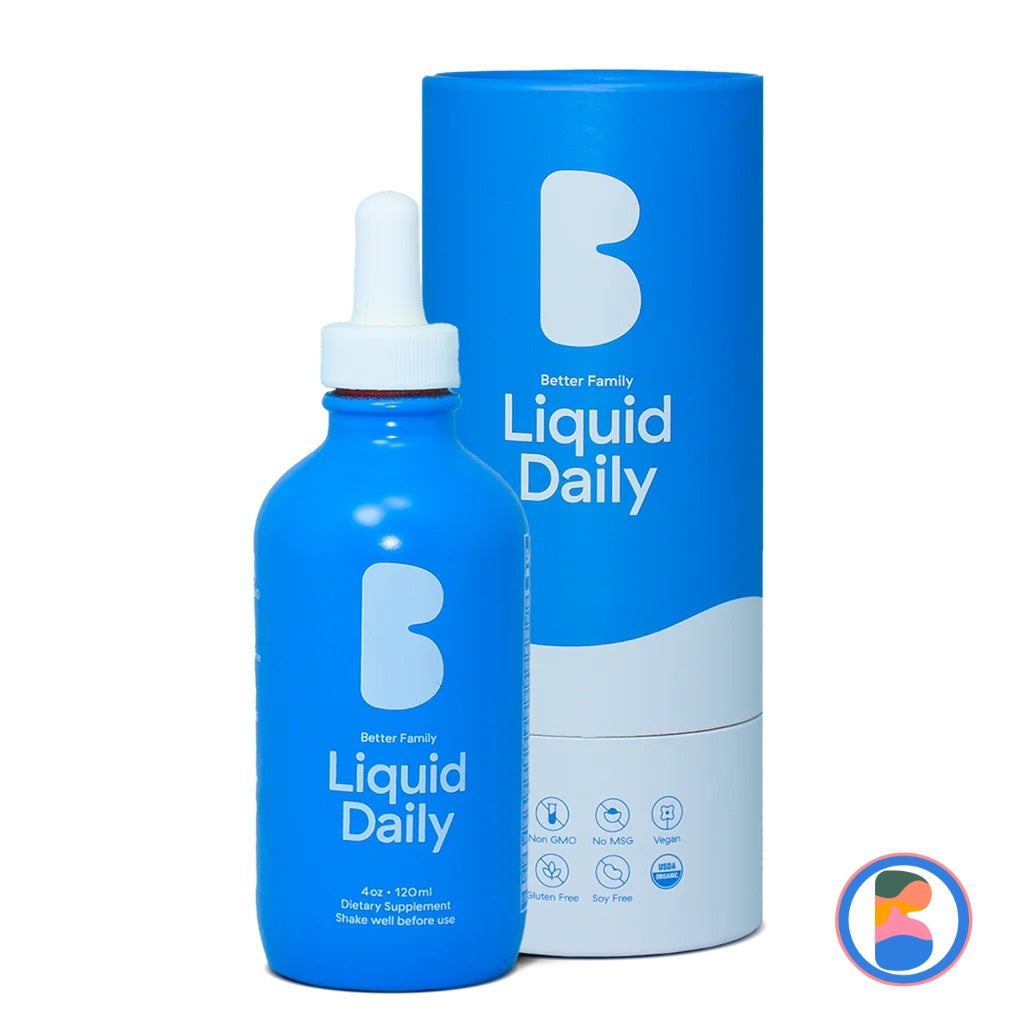Better Family Article Series
Liquid Multivitamins
The Absorption Advantage
This article series is brought to you by the team behind Liquid Daily: the better option for filling nutritional gaps in your household.
Liquid Is Better
Simplify Your Routine
You're In Control

Article Highlights
- Vitamin D is necessary for building and maintaining healthy bones as well as supporting function in the brain, muscles, and immune system.
- Not naturally occurring in many food sources, vitamin D is most often obtained from sun exposure, making deficiencies in this important nutrient quite common in the United States and especially during the winter months.
- Taking vitamin D supplements or multivitamins that contain healthy amounts of vitamin D (15 mcg being the RDA) can help combat or even prevent future deficiencies.
How to Get Vitamin D In Winter
Among the 13 essential vitamins, there is one that stands out as slightly different from the others. Vitamin D, a fat-soluble vitamin, plays many important roles throughout your body’s various systems. As you may be aware, it has a key part to play in bone health in particular, helping the body absorb calcium, which is required for both building and maintaining strong bones. Without adequate amounts of vitamin D and calcium in the bloodstream, you may be at a higher risk for developing diseases like osteoporosis that weaken your body’s bones. Along with bone health, vitamin D also supports functioning in the brain, muscles, and immune system, helping to facilitate movement and transport messages between the body and brain (1).
As you might imagine, the benefits of providing yourself with a healthy amount of vitamin D manifest both physically and mentally, thanks to its varied roles in the human body. The anti-inflammatory properties of this vital nutrient are important for physical health. It may even be able to reduce cancer cell growth and prevent heart disease and diabetes (2). In terms of mental wellness, vitamin D may be able to help with mood regulation and lessen the severity of depression symptoms. A recent study found that supplementing individuals experiencing major depressive disorder with vitamin D lowered their negative emotions, especially for those who also had a vitamin D deficiency (3). Clearly, vitamin D benefits are a must-have to complete the full picture of both physical and mental wellness.
In this article, we will discuss various vitamin D sources, as this elusive nutrient is obtained differently than most vitamins and minerals. We will also explore how to go about taking vitamin D winter supplements both safely and effectively to ensure that you are experiencing all the benefits it has to offer while avoiding any potential vitamin D side effects.
"I give Liquid Daily to my daughter and she barely tastes it, even just added to water, which is great!"
- Olivia T.
Try the lightly and naturally flavored liquid multivitamin that can be added to any juice, drink, or even water.
Try Liquid Daily
Try the lightly and naturally flavored liquid multivitamin that is nearly undetectable added to any juice, drink, or even water.
"I give Liquid Daily to my daughter and she barely tastes it, even just added to water, which is great!"
- Olivia T.
How To Get Vitamin D In Winter From Sun
As we mentioned, vitamin D is quite unique when it comes to its natural absorption. Unlike other vitamins and minerals, which your body absorbs from a well-balanced diet, vitamin D is obtained from the sun. Or, rather, it is produced as a byproduct of sun exposure. If you have heard this important nutrient being referred to as the “sunshine vitamin,” then you likely know you need sun exposure to maintain a healthy amount of it. But how do you absorb vitamin D from the sun? How exactly does the process work?
Try Liquid Daily
Try Liquid Daily - the methylated liquid multivitamin packed with 20 essential vitamins & minerals.
- 18 Essential Vitamins & Minerals
- Advanced Liquid Absorption
- Zero sugars, fillers, or artificial flavorings
- Safe & Effective for Kids & Adults!
Try Liquid Daily
Liquid Daily is the all-in-one liquid multivitamin that is nearly tasteless when added to any drink or juice!
- 18 Essential Vitamins & Minerals
- Advanced Liquid Absorption
- Zero sugars, fillers, or artificial flavorings
- Safe & Effective for Kids & Adults
[Limited Offer]
Contrary to popular belief, vitamin D is not absorbed from sunlight. Instead, sunlight reacts with a protein in your skin, converting it into vitamin D3. In this way, your body naturally synthesizes vitamin D rather than relying on outside sources for absorption.
During sunny seasons like spring and summer or in environments with year-round sunshine, vitamin D deficiency is not always an issue. But, in areas that experience harsher cold seasons with very little sunny weather, many people may be left wondering how to get sunlight in winter and maintain their bodies’ vitamin D stores. Since vitamin D is a fat-soluble vitamin, it may be stored in the liver or fatty tissues when collected during summer months, leaving you with a starter supply at the beginning of winter. However, as the cold weather progresses, you may need to turn to dietary sources of vitamin D like supplements and fortified foods in order to boost your body’s supply.
If you are truly determined to find out how to get vitamin D in winter from the sun specifically, then you should keep in mind that various factors may affect how your body produces this nutrient. For example, lighter skin tones may only need to be exposed to sunlight for about 15 minutes, whereas darker skin tones may require twice the amount of exposure to produce the same amount (4). Some smartphone apps can help you track an estimate of how much vitamin D you generate during each stint outdoors.
Best Vitamin D Supplement For Winter
Although vitamin D is harder to come by in the winter months, your body needs the same amount all year long. Therefore, the best vitamin D supplement for winter will be largely identical to the best form of vitamin D for absorption at any point in the year. Let’s explore some of the key features that should characterize any worthy vitamin D supplement.
Vitamin D represents a family of vitamins: D1, D2, and D3. Vitamin D3 is the active form of the nutrient that is stored inside the body. Studies suggest that D3 is likely the most effective form for absorption and use by the human body, as it raises levels of vitamin D in the bloodstream more than other forms do (5). For this reason, you may want to seek out supplements that specifically utilize vitamin D3 in their formulas.
Generally, we also tend to recommend organic supplements over synthetic alternatives. The best organic vitamin D3 supplement should have a USDA seal, certifying that it has been made with at least 90% organic ingredients. USDA certified supplements provide peace of mind in knowing that the ingredients in the formulas have been grown in accordance with the standards of organic farming and do not use pesticides, insecticides, or GMOs.
If you are worried about your children’s nutrition, then you may also be interested in characteristics of the best vitamin D supplement for kids. In the case of both children and adults, liquid formulas are usually preferable, as they offer superior absorption rates compared to pills and lower sugar intake compared to gummies. Liquid vitamins are also great for picky eaters who may enjoy the pleasant taste or not even notice the supplement when it is hidden in their favorite drink.
Vitamin D Foods
Vitamin D is a nutrient that is designed to be synthesized by the body rather than absorbed from your diet. For this reason, the list of vitamin D foods is quite short, as it simply does not appear in most food sources. The best vitamin D foods tend to be animal products such as fish, egg yolks, cheese, and liver. Fatty fish are an excellent source of the sunshine vitamin, particularly salmon, mackerel, and tuna. Cod liver oil is another viable option as well.
If you are a vegetarian or someone who simply does not enjoy fish, then you may need to look elsewhere. Vitamin D foods for vegetarians are typically those which have been fortified with vitamin D, meaning that a supply of the nutrient that is not naturally occurring has been added to the food source during processing. Dairy products, orange juice, cereal, and even soy milk are often fortified with vitamin D, sometimes placing them among the top 10 vitamin D foods and creating an alternative way to boost your diet with this key nutrient.
Vitamin D Deficiency
Vitamin D deficiency is among the most prevalent nutrient deficiencies in the United States, appearing alongside iron and vitamin B6 in a nutrient report by the CDC (6). With sunlight largely unavailable and most people electing to stay inside to avoid the cold, vitamin D deficiency during winter is quite typical. However, anyone who lives in a harsher climate or who is unable to find time to go outside may notice their body’s stores of this vital nutrient depleting. Low vitamin D symptoms in adults can impact the body both mentally and physically, including bone pain, fatigue or muscle weakness, and mood changes (7). In fact, vitamin D deficiency and neurological symptoms like difficulty concentrating and memory loss have also been linked.
Vitamin D deficiency symptoms can be combated by finding ways to boost your intake of this important nutrient. Increasing time spent outdoors or exposed to sunlight is the most obvious and natural solution to the problem, but for severe cases of deficiency, you may need to seek out additional sources of vitamin D. Vitamin D supplements or multivitamins that contain vitamin D may be an excellent way to increase intake, especially during the winter months. Just keep in mind that you should always consult with your physician before adding any supplement to your wellness routine.
How Much Vitamin D Per Day
If you are relatively new to the world of supplements, you may be wondering how to take vitamin D correctly. Is it better to take vitamin D every day or once a week? How much vitamin D per day is sufficient and how much is too much? You should aim to select supplements that offer a healthy amount of vitamin D without exceeding the recommended dietary allowance (RDA) each day. Below, we have provided a chart courtesy of the National Institutes of Health that outlines the RDA for vitamin D according to various demographics (8):
- 0 to 12 months old: 10 mcg
- 1 to 13 years old: 15 mcg
- 14 to 18 years old: 15 mcg
- 19 to 70 years old: 15 mcg
- 70+ years old: 20 mcg
- Pregnant and breastfeeding individuals: 15 mcg
As you can see, how much vitamin D per day for a woman and how much vitamin D per day for a man does not matter much. Age is more of a determining factor for dosage, but 15 mcg is the standard for most children and adults. Of course, exceptions may occur according to other factors and health conditions. However, as a general rule, staying within the RDA for any nutrient should help ensure that you do not experience any adverse side effects when taking a supplement.
Resources
- “Vitamin D: Fact Sheet for Consumers.” National Institutes of Health, 2 June 2022, https://ods.od.nih.gov/factsheets/VitaminD-Consumer.
- “Vitamin D.” Harvard School of Public Health, January 2022, https://www.hsph.harvard.edu/nutritionsource/vitamin-d.
- Cheng, Ying-Chih et al. “The Effect of Vitamin D Supplement on Negative Emotions: A Systematic Review and Meta-Analysis.” Depression and Anxiety, June 2020, https://pubmed.ncbi.nlm.nih.gov/32365423.
- Callahan, Alice. “Do I Get Enough Vitamin D in the Winter?” New York Times, https://www.nytimes.com/2018/02/16/well/live/do-i-get-enough-vitamin-d-in-the-winter.html.
- Tripkovic, Laura et al. “Comparison of Vitamin D2 and Vitamin D3 Supplementation in Raising Serum 25-Hydroxyvitamin D Status: A Systematic Review and Meta-Analysis.” The American Journal of Clinical Nutrition, June 2012, https://pubmed.ncbi.nlm.nih.gov/22552031.
- “CDC’s Second Nutrition Report: A Comprehensive Biochemical Assessment of the Nutrition Status of the U.S. Population.” CDC, 2012, https://www.cdc.gov/nutritionreport/pdf/4page_ 2nd nutrition report_508_032912.pdf
- “Vitamin D Deficiency.” Cleveland Clinic, 16 October 2019, https://my.clevelandclinic.org/health/articles/15050-vitamin-d--vitamin-d-deficiency.
- “Vitamin D: Fact Sheet for Health Professionals.” National Institutes of Health, 2 June 2022, https://ods.od.nih.gov/factsheets/VitaminD-HealthProfessional.
More articles from Better Family
- Family Multivitamin
- Liquid Multivitamins
- Best Liquid Multivitamin for Kids
- Chewable vs Liquid Vitamins
- Comparing Monthly Vitamin Subscriptions
- Best Multivitamin for the Whole Family
- Family Diet And Menu Planning
- Multivitamin Liquid Side Effects
- Best Vitamin B12 Liquid Drops
- Liquid Children's Vitamins
- Vitamin Subscription Box
- Good Tasting Liquid Vitamins
- Liquid Vitamin B6 Supplement
- Liquid Selenium Supplement
- Liquid Vitamin E Supplement
- Liquid Vitamin B1 Supplement
- Liquid Vitamin B3 Supplement
- How Does A Multivitamin Syrup Work?
- How to Get Vitamin D in Winter
- Family Health Goals (1 of 2)
- Family Health Goals (2 of 2)
- Family Health and Wellness Programs
- How to Absorb Multivitamins Better
- Family Nutrition Tips
- Liquid Multivitamin for Adults
- Liquid Multivitamin for Seniors
- Liquid Vitamins and Minerals
- Why Do We Need To Take Multivitamins?
- Liquid Zinc Supplement
- Vitamin Absorption Chart
- Vitamins That Taste Good
- Liquid Chromium Supplement
- Liquid Silicon Dioxide Supplement
- Liquid Vitamin D Supplement
- Liquid Vitamin B9 Supplement
- Best Multivitamin Syrup For Adults
- Best Liquid Multivitamin For Autism
- Vitamin Subscription Services
- Can You Dissolve Multivitamins in Water?
- Organic Liquid Multivitamins and Minerals
- Tasteless Liquid Vitamins
- Nutrition For The Whole Family
- B Complex Liquid Drops
- Best Liquid Vitamins for Elderly
- Soluble Vitamins
- How To Take Multivitamins
- Tasteless Liquid Vitamins For Toddlers
- Liquid Zinc Benefits
- Best Tasting Gummy Vitamins
- Liquid Iodine Supplement
- Liquid Vitamin K Supplement
- Liquid Vitamin B12 Supplement
- Liquid Vitamin B7 Supplement
- Multivitamin Syrup For Adults
- 4 Health Tips For Winter You Can't Miss


